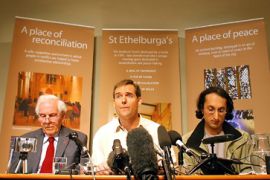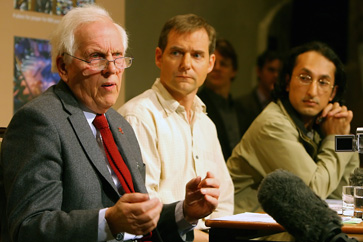Iraq hostages reject death penalty
Peace activists captured last year say they may not testify against their captors.

 |
| The peace campaigners were reunited for the first time as they explained the decision |
Three peace activists held captive in Iraq last year say they may not testify against their captors in a trial due next year.
The members of the Christian Peacemaker Team (CPT) – Norman Kember, from the United Kingdom and James Loney and Harmeet Singh Sooden, both Canadians – were captured along with Tom Fox, an American, by an armed group in Iraq in November 2005.
They were freed by UK and US forces four months later, but not before Fox was reportedly killed trying to escape.
The peace campaigners were reunited for the first time as they explained their decision.
“We ourselves have no desire for punishment or retribution. We lay aside any right we may have,” Loney told Aljazeera.
They are concerned their alleged captors could be executed.
“It’s the death penalty issue that has made us particularly active in trying to ensure that in some way or another, these guys are given clemency,” Kember said.
“Iraq is desperately in need of reconciliation between the various groups, and if in some tiny way we can help that process, then that’s what we want to do.”
Need for balance
But Saleh Majid, an Iraqi lawyer living in Germany, says the CPT members must work within Iraq’s existing legal system.
| Norman Kember |
|
“Iraq is desperately in need of reconciliation between the various groups, and if in some tiny way we can help that process, then that’s what we want to do” |
“They have to be made to testify, the situation we have [in Iraq] is very extreme,” he says, “the death penalty every day is executed against thousands of Iraqis [victims of the conflict], and so you have to balance things.”
“Every country has its system of justice, whether people are sentenced to death or not, but one should assist justice as far as reasonable, so abstaining from giving evidence is not really fair,” Majid says.
But Loney insists executing their captors will breed more violence, not stem it. The kidnapping, he says, is among many of the consequences that resulted from the US-led invasion and occupation of Iraq.
Revenge for Falluja
“This is not to excuse what was done, but they made choices because they were in an extreme situation,” Loney said of his former captors.
“One of the captors told us he was from Falluja, and that his mother and father, his fiancé, his sister and his best friend were killed when his house was bombed by the US and I asked him so what would you be doing if there hadn’t been a war – ‘well, I’d be helping my father in the market’.”
Piers Bannister works on Amnesty International’s campaign against the death penalty, and he understands that reaction.
“I’ve worked with people who’ve befriended the murderer of their daughter or son as they fight to save his life,” he said, “there’s forgiveness there but there’s still a hunger for justice.”
The three former hostages chose to make their announcement at London’s St Ethelburga’s Centre for Reconciliation. It is a poignant site – it was damaged in the Second World War, and was targeted by an IRA bomb attack in 1993.